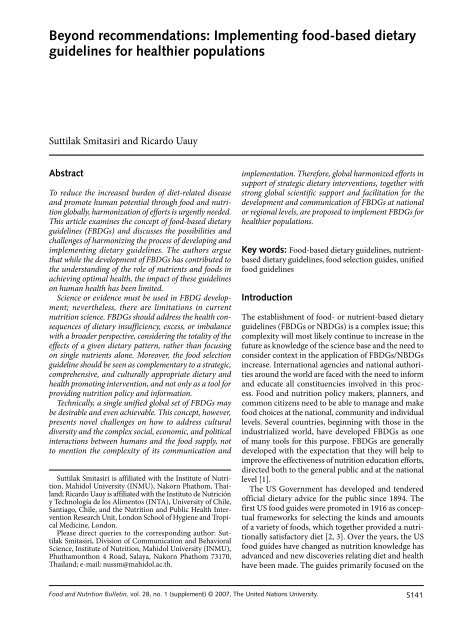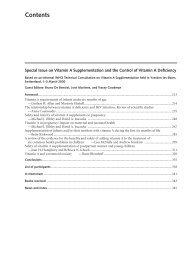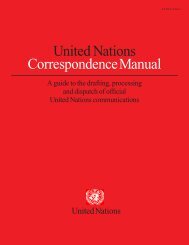Implementing food-based dietary guidelines for - United Nations ...
Implementing food-based dietary guidelines for - United Nations ...
Implementing food-based dietary guidelines for - United Nations ...
Create successful ePaper yourself
Turn your PDF publications into a flip-book with our unique Google optimized e-Paper software.
Beyond recommendations: <strong>Implementing</strong> <strong>food</strong>-<strong>based</strong> <strong>dietary</strong><br />
<strong>guidelines</strong> <strong>for</strong> healthier populations<br />
Suttilak Smitasiri and Ricardo Uauy<br />
Abstract<br />
To reduce the increased burden of diet-related disease<br />
and promote human potential through <strong>food</strong> and nutrition<br />
globally, harmonization of ef<strong>for</strong>ts is urgently needed.<br />
This article examines the concept of <strong>food</strong>-<strong>based</strong> <strong>dietary</strong><br />
<strong>guidelines</strong> (FBDGs) and discusses the possibilities and<br />
challenges of harmonizing the process of developing and<br />
implementing <strong>dietary</strong> <strong>guidelines</strong>. The authors argue<br />
that while the development of FBDGs has contributed to<br />
the understanding of the role of nutrients and <strong>food</strong>s in<br />
achieving optimal health, the impact of these <strong>guidelines</strong><br />
on human health has been limited.<br />
Science or evidence must be used in FBDG development;<br />
nevertheless, there are limitations in current<br />
nutrition science. FBDGs should address the health consequences<br />
of <strong>dietary</strong> insufficiency, excess, or imbalance<br />
with a broader perspective, considering the totality of the<br />
effects of a given <strong>dietary</strong> pattern, rather than focusing<br />
on single nutrients alone. Moreover, the <strong>food</strong> selection<br />
guideline should be seen as complementary to a strategic,<br />
comprehensive, and culturally appropriate <strong>dietary</strong> and<br />
health promoting intervention, and not only as a tool <strong>for</strong><br />
providing nutrition policy and in<strong>for</strong>mation.<br />
Technically, a single unified global set of FBDGs may<br />
be desirable and even achievable. This concept, however,<br />
presents novel challenges on how to address cultural<br />
diversity and the complex social, economic, and political<br />
interactions between humans and the <strong>food</strong> supply, not<br />
to mention the complexity of its communication and<br />
Suttilak Smitasiri is affiliated with the Institute of Nutrition,<br />
Mahidol University (INMU), Nakorn Phathom, Thailand;<br />
Ricardo Uauy is affiliated with the Instituto de Nutrición<br />
y Technología de los Alimentos (INTA), University of Chile,<br />
Santiago, Chile, and the Nutrition and Public Health Intervention<br />
Research Unit, London School of Hygiene and Tropical<br />
Medicine, London.<br />
Please direct queries to the corresponding author: Suttilak<br />
Smitasiri, Division of Communication and Behavioral<br />
Science, Institute of Nutrition, Mahidol University (INMU),<br />
Phuthamonthon 4 Road, Salaya, Nakorn Phathom 73170,<br />
Thailand; e-mail: nussm@mahidol.ac.th.<br />
implementation. There<strong>for</strong>e, global harmonized ef<strong>for</strong>ts in<br />
support of strategic <strong>dietary</strong> interventions, together with<br />
strong global scientific support and facilitation <strong>for</strong> the<br />
development and communication of FBDGs at national<br />
or regional levels, are proposed to implement FBDGs <strong>for</strong><br />
healthier populations.<br />
Key words: Food-<strong>based</strong> <strong>dietary</strong> <strong>guidelines</strong>, nutrient<strong>based</strong><br />
<strong>dietary</strong> <strong>guidelines</strong>, <strong>food</strong> selection guides, unified<br />
<strong>food</strong> <strong>guidelines</strong><br />
Introduction<br />
The establishment of <strong>food</strong>- or nutrient-<strong>based</strong> <strong>dietary</strong><br />
<strong>guidelines</strong> (FBDGs or NBDGs) is a complex issue; this<br />
complexity will most likely continue to increase in the<br />
future as knowledge of the science base and the need to<br />
consider context in the application of FBDGs/NBDGs<br />
increase. International agencies and national authorities<br />
around the world are faced with the need to in<strong>for</strong>m<br />
and educate all constituencies involved in this process.<br />
Food and nutrition policy makers, planners, and<br />
common citizens need to be able to manage and make<br />
<strong>food</strong> choices at the national, community and individual<br />
levels. Several countries, beginning with those in the<br />
industrialized world, have developed FBDGs as one<br />
of many tools <strong>for</strong> this purpose. FBDGs are generally<br />
developed with the expectation that they will help to<br />
improve the effectiveness of nutrition education ef<strong>for</strong>ts,<br />
directed both to the general public and at the national<br />
level [1].<br />
The US Government has developed and tendered<br />
official <strong>dietary</strong> advice <strong>for</strong> the public since 1894. The<br />
first US <strong>food</strong> guides were promoted in 1916 as conceptual<br />
frameworks <strong>for</strong> selecting the kinds and amounts<br />
of a variety of <strong>food</strong>s, which together provided a nutritionally<br />
satisfactory diet [2, 3]. Over the years, the US<br />
<strong>food</strong> guides have changed as nutrition knowledge has<br />
advanced and new discoveries relating diet and health<br />
have been made. The guides primarily focused on the<br />
Food and Nutrition Bulletin, vol. 28, no. 1 (supplement) © 2007, The <strong>United</strong> <strong>Nations</strong> University. S141




